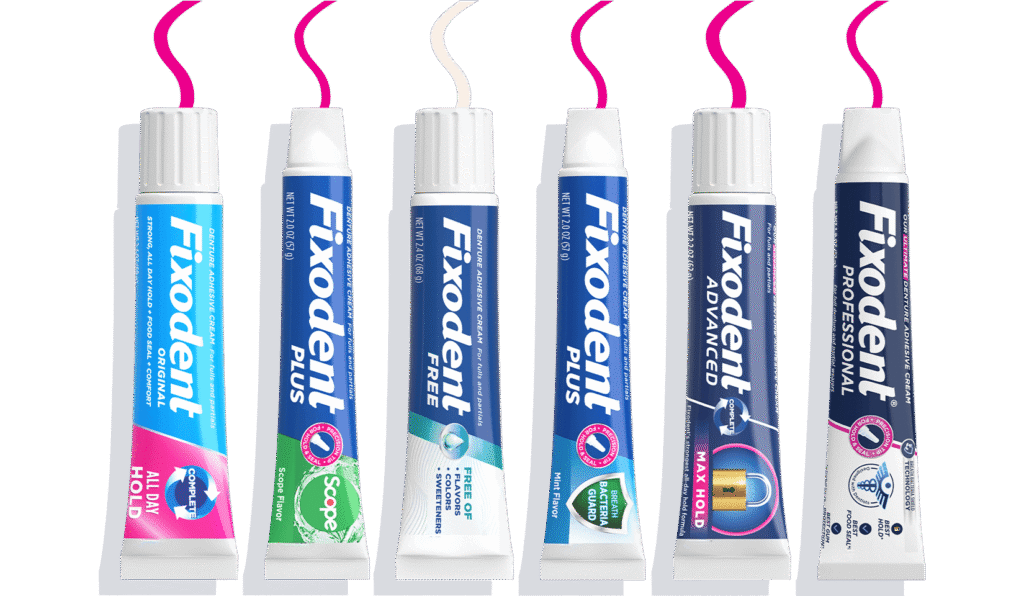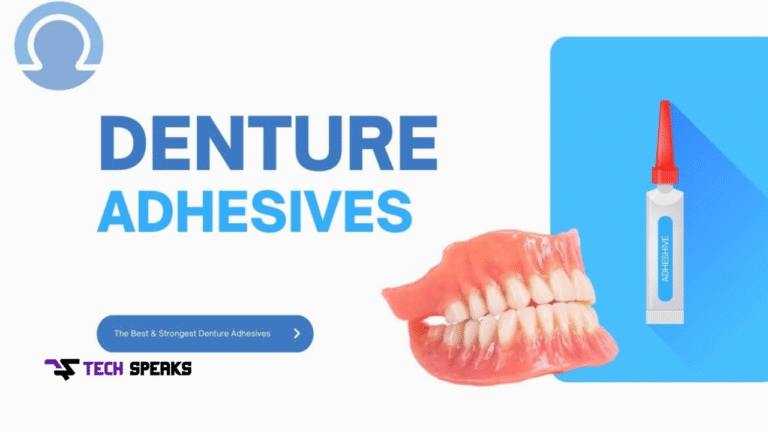Denture adhesives help keep false teeth secure and comfortable. Whether you’re new to dentures or have been using them for years, finding the best denture adhesive can make a world of difference in how you eat, speak, and smile with confidence. This guide breaks down everything you need to know.
What Is a Denture Adhesive? (And Why You Might Need One)
A denture adhesive is a glue-like substance designed to keep dentures (false teeth) firmly in place throughout the day. While dentures are custom-fitted, small gaps between your gums and the denture plate can lead to slipping, irritation, or food getting stuck underneath.
Many people find that using an adhesive gives them extra peace of mind—especially when eating chewy or crunchy foods or when speaking in public. If your dentures sometimes shift, or you feel uncomfortable without added support, a high-quality adhesive can solve that.
Even well-fitted dentures can loosen over time due to bone changes, weight loss, or aging. That’s when a good denture adhesive becomes essential. It fills the gaps, provides cushioning, and holds the dentures tightly to your gums.
What Makes the Best Denture Adhesive?
The best denture adhesive combines strong holding power, comfort, easy cleaning, and safety. But not all products work the same for everyone. Some people need extra-strong hold for full dentures, while others need gentle formulas for partial dentures or sensitive gums.
When choosing the best denture adhesive, consider:
- Holding Strength: Look for long-lasting adhesives that can hold for up to 12 to 24 hours.
- Comfort: Some adhesives add a cushion-like layer between gums and dentures to prevent sores.
- Zinc-Free: Many users prefer zinc-free adhesives, especially those with health concerns or sensitive skin.
- Flavor: Some adhesives have a minty or neutral taste, while others might leave an unpleasant aftertaste.
- Ease of Removal: A good adhesive should be easy to clean off dentures and gums without harsh scrubbing.
Top searched related keywords:
✅ denture adhesive for lower dentures,
✅ best denture cream for upper dentures,
✅ zinc free denture glue,
✅ strongest denture adhesive without zinc,
✅ best denture adhesive for eating steak
Types of Denture Adhesives You Can Choose From
There are different types of denture adhesives available. Choosing the right one depends on your daily habits, comfort preferences, and how strong of a hold you need. Let’s break them down.

Cream Denture Adhesives
These are the most common type and come in a tube. You apply a few dabs to your dentures before placing them in your mouth. Cream adhesives offer a strong, lasting hold and are great for full-day use. Many come in zinc-free versions and are available with or without flavor.
Pros:
- Long-lasting hold (up to 12-24 hours)
- Easy to apply
- Available in various formulations
Popular search terms: denture adhesive cream reviews, best denture adhesive cream for upper dentures, secure denture adhesive cream
Powder Denture Adhesives
Powder adhesives are sprinkled onto the damp surface of your dentures. They’re less messy than creams and are ideal for those who want a clean feel without thick residue. Powders provide a good seal and help prevent food particles from slipping under the denture.
Pros:
- Lightweight and clean feel
- Easy to apply and remove
- Good for sensitive gums
Low KD keywords: denture powder adhesive, how to use denture powder, denture adhesive powder reviews
Strip or Pad Adhesives
These come in pre-cut adhesive strips or pads that you place on the denture surface. They are mess-free and super easy to use. They provide a moderate hold, which is suitable for partial dentures or short-term wear.
Pros:
- Mess-free application
- Great for beginners
- No sticky residue
People also search: best denture adhesive strips, strip adhesive for partial dentures
Top Picks for the Best Denture Adhesives (That Actually Work)
There are many products out there, but a few stand out for performance, comfort, and user satisfaction. Based on reviews, keyword popularity, and expert opinions, here are the top picks:
- Fixodent Ultra Max Hold – Offers a super-strong hold that lasts all day. Zinc-free formula and great for both upper and lower dentures.
- Secure Denture Adhesive (Waterproof) – Long-lasting and waterproof. Holds for up to 12 hours even when eating and drinking.
- Poligrip Free Denture Adhesive Cream – Zinc-free, no artificial colors or flavors, ideal for sensitive users.
- Cushion Grip Thermoplastic Adhesive – Acts as both an adhesive and reline material. Provides long-lasting comfort for up to 4 days per application.
- Sea-Bond Denture Adhesive Seals – Mess-free alternative in strip form. Comfortable, clean feel and no ooze.
These products are frequently searched using keywords like:
best glue for dentures, top rated denture adhesives, longest lasting denture adhesive, best denture adhesive for lower jaw
How to Use Denture Adhesive the Right Way
Using denture adhesive properly is key to comfort and performance. Here’s a simple step-by-step guide:
- Clean and dry your dentures thoroughly.
- Apply the adhesive as directed (small dabs or a thin strip).
- Avoid overusing—too much adhesive can make things worse.
- Insert dentures and hold firmly for a few seconds.
- Wait a few minutes before eating or drinking.
Make sure to start with a small amount. You can always add more later if needed. Too much adhesive might cause oozing and discomfort.
Mistakes to Avoid When Using Denture Adhesive
Many users make common mistakes that affect comfort and denture hold. Avoid these pitfalls:

- Using too much adhesive – A little goes a long way.
- Applying on wet dentures – Always dry them first for a better bond.
- Not cleaning daily – Old adhesive buildup can cause irritation.
- Ignoring gum health – Denture adhesives won’t fix sore gums or ill-fitting dentures.
Natural and Zinc-Free Options (If You Have Sensitive Skin)
If you have allergies or sensitive gums, it’s best to go with natural or zinc-free denture adhesives. These formulas avoid chemicals, dyes, and artificial ingredients that can cause burning, rashes, or mouth sores.
Some excellent options include:
- Avistar Natural Denture Adhesive – Made with plant-based ingredients.
- Poligrip Free – Zinc-free, preservative-free, and unflavored.
Relevant searches: natural denture adhesive, zinc free denture adhesive reviews, hypoallergenic denture glue
How Long Should a Denture Adhesive Last?
A good adhesive should last 12 to 24 hours. However, results can vary based on:
- Saliva production
- Diet (sticky or hard foods wear adhesives faster)
- Adhesive type
If your adhesive isn’t holding for long, try a different formula or consult your dentist. Overuse won’t help—better fitting or better products will.
When to See a Dentist About Loose Dentures
If you’re constantly needing adhesive or experiencing pain, it might be time to see your dentist. Loose dentures could mean your gums or jawbone have changed shape, and a reline or new denture may be needed.
Warning signs:
- Adhesive no longer works
- Sores or cuts in the mouth
- Food constantly gets stuck under dentures
Searching terms: dentures won’t stay in with adhesive, dentures keep falling out, when to get new dentures
What Is a Denture Adhesive and Why Do You Need One?
In simple terms, a denture adhesive is like a glue that helps hold your false teeth in place. You may need one if your dentures shift while talking, fall out when eating, or if you just want extra peace of mind throughout the day.
Even perfectly made dentures may not stay in place forever. As your mouth changes with age, a reliable adhesive can help you avoid accidents and eat or talk without worry.
The Bottom Line
Finding the best denture adhesive isn’t just about choosing the strongest glue. It’s about finding a product that fits your lifestyle, oral health, and comfort level. Whether you prefer a cream, powder, or strip, there’s an option out there that can help you smile, eat, and live more confidently.
Start with a trusted brand, go for zinc-free if you’re sensitive, and don’t be afraid to try a few options before settling. If adhesives aren’t working anymore, always consult your dentist—your oral health deserves the best.

